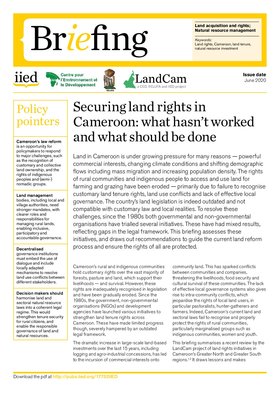Post-conflict land governance reform in the African Great Lakes region. Part III - Securing tenure of smallholder peasants.
La réforme post-conflit de la gouvernance foncière dans la région des Grands Lacs en Afrique. Partie II - Remaniement foncier en faveur du
La réforme post-conflit de la gouvernance foncière dans la région des Grands Lacs en Afrique. Partie III - Garantir les droits fonciers des petits exploitants paysans
Securing land rights in Cameroon: what hasn’t worked and what should be done
Land in Cameroon is under growing pressure for many reasons — powerful commercial interests, changing climate conditions and shifting demographic flows including mass migration and increasing population density. The rights of rural communities and indigenous people to access and use land for farming and grazing have been eroded — primarily due to failure to recognise customary land tenure rights, land use conflicts and lack of effective local governance. The country’s land legislation is indeed outdated and not compatible with customary law and local realities.
Land Tenure in Development Cooperation. Guiding Principles
Land tenure issues are becoming increasingly important worldwide. Problems such as high population pressure, increases in resource degradation, food shortages, transformations of political systems and regional and supra-regional resource conflicts have brought the land issue to the public's attention.
Land conflicts in relation to land reform and common agricultural policy implementation: evidence from Romania
land conflicts, land reform, CAP implementation, Romania, Agricultural and Food Policy,
Land conflicts in North Caucasus: intensifying the confrontation
Land conflicts in 2013 continued to occupy an important position in the socio-economic and political agenda in the North Caucasus. North Caucasus, Dagestan Republic
Rural-rural Migration and Land Conflicts: Implications on Agricultural Productivity in Uganda
We use community and household data with plot-level information to explore the determinants of different forms of land conflicts and the conflicts’ impact on agricultural productivity in Uganda. Tracing rural-rural migration patterns, we find that communities that receive/host more immigrants (and thus have many coexisting tribes) tend to have more land conflicts than those sending migrants out.
Hoja Informativa N.º 3 Obstáculos en el marco de la titulación de las tierras de comunidades nativas en Ucayali (a marzo de 2017)
This fact sheet presents the results of a study carried out between Dezember 2016 and March 2017 by the Instituto del Bien Común (IBC) on the possible obstacles of land titling of native communities in the region of Ucayali. The study is developed in coordination with the Regional Directorate of Agriculture of Ucayali (DRAU) and indigenous regional organizations, with support from the German development cooperation, implemented by the Deutsche Gesellschaft für Internationale Zusammenarbeit (GIZ) GmbH, through the ProTierras Comunales project.
Hoja Informativa N.º 3 Obstáculos en el marco de la titulación de las tierras de comunidades nativas en Ucayali (a marzo de 2017)
Esta hoja informativa presenta los resultados de un estudio realizado entre diciembre de 2016 y marzo de 2017 por el Instituto del Bien Común (IBC) sobre los obstáculos de la titulación de tierras de las comunidades nativas en la región de Ucayali. El estudio se elaboró en coordinación con la Dirección Regional de Agricultura de Ucayali (DRAU) y las organizaciones regionales indígenas, con el apoyo de la cooperación alemana para el desarrollo, ejecutada por la Deutsche Gesellschaft für Internationale Zusammenarbeit (GIZ) GmbH, a través del proyecto ProTierras Comunales.
Hoja Informativa N.º 1: Situación de las tierras de comunidades nativas en la Región de San Martín (a junio de 2016)
El mapa y los datos que se presentan en esta hoja informan sobre el resultado de la actualización de la línea de base del sistema de información comunitaria sobre los nativos de la Amazonia peruana (SICNA) en la región amazónica de San Martín realizada por el Instituto del Bien Común (IBC). Se llevó a cabo durante el primer semestre de 2016, con el apoyo de la Cooperación Alemana, implementado por el GIZ, a través de su proyecto ProTierras Comunales.


